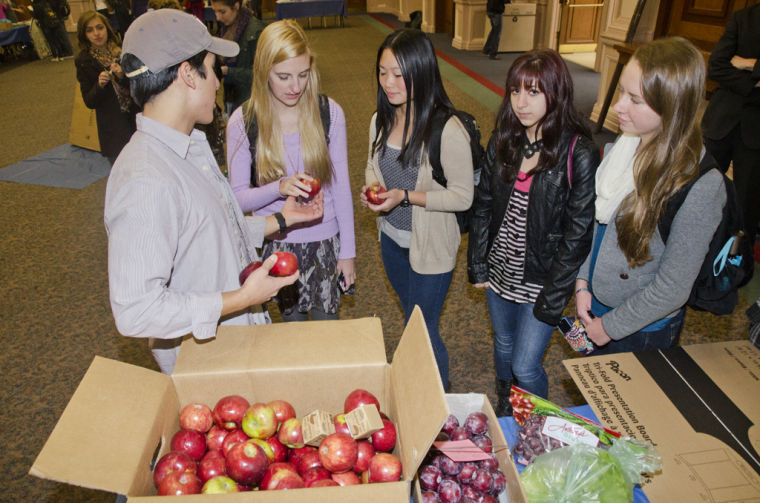Pitt celebrates Food Day with discussions of health, sustainability
October 24, 2013
Students who came to the William Pitt Union ballroom on Thursday were surprised to learn that Americans spend less on food and eat less healthy than people in comparable countries.
Students learned this fact from a graph that the Premedical Organization for Minority Students set up as part of the second annual Food Day, which was sponsored by Free the Planet. Roughly 100 students came to see the 10 or so organizations that set up on Thursday afternoon, received free samples and learned about sustainable food. The organizations present said that they got involved with the event to try to get students to eat healthier, more sustainable food.
In addition to the graph on worldwide eating habits, the organization set up a game in which students matched images of vegetables, fruits and meats to the vitamin each food provides. For example, oranges went in the vitamin C category.
After the game, Olivia Gant, the social committee chair for the organization, told students about the benefits of vitamins. For instance, a deficiency in vitamin B-6 can cause anemia.
“When students get to college, they don’t know what they are eating, because they aren’t getting home-cooked meals,” Gant said.
Eda Chen, the organization’s business manager, drew a connection between the American diet and health care costs..
“The U.S. spends much less on foods which aren’t as good for you, so health care cost rises,” she said.
Plant to Plate, a student club focused on sustainability and urban agriculture, was at the event encouraging students to wrap kale seeds in a piece of newspaper and plant the package. With water and sun, the kale would grow and could be used in chips and smoothies. Club members provided recipes for both on fliers.
Jodi Lincoln, a senior anthropology and film studies major and member of Plant to Plate, wants the process of food production to be more transparent.
“People don’t know where food comes from, how it is cooked and what pesticides are used,” Lincoln said.
Janet McKee told students who approached her table that the samples of chocolate dessert she was handing out were healthy. The dessert was comprised of organic bananas, cocoa and vanilla and it excluded additional sugar or fat.
McKee also discussed with students “Bethany’s Story,” a documentary she helped produce.
The film, which was released earlier this year, follows Bethany, a young woman who was paralyzed after an adverse reaction to a medication. For three years, she was told she would never walk again.
But after eating a plant-based diet for five months, she was able to run.
Erin Hughes came to the event representing East End Food Co-op, a health food store located on Meade Street in Point Breeze.
Steve Nicolet, a senior urban studies and pre-med major and co-leader of Free the Planet, said that he hoped the event encouraged students to explore areas of Pittsburgh beyond Oakland.
“Food is a common thread. It helps give people something interesting to do,” Nicolet said.
Kirstyn Gudknecht, a co-leader of Free the Planet, also attended the event. Gudknecht, a sophomore urban studies and environmental studies major, said they decided to hold the event because “food issues in this country cause some of the most pressing environmental issues.”
Gudknecht said food challenges and issues can affect numerous aspects of life, from weather patterns to poverty rates.
Lora Matway, a sophomore urban studies major who attended the event, said that she appreciates people who practice moderation in their eating habits.
“If everybody ate a little more organic, healthier, there wouldn’t be a drastic demand to change the way we eat,” Matway said.



